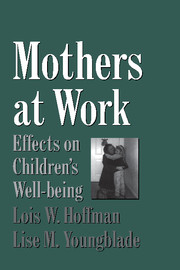Book contents
- Frontmatter
- Contents
- Preface
- 1 Introduction and Review of the Literature
- 2 Methodology
- 3 Children's Daily Family Lives: The After-School Day Interview
- 4 The Husband–Wife Relationship
- 5 The Mother's Well-being
- 6 Childrearing
- 7 Maternal Employment and Child Outcomes: The Direct Relationships
- 8 The Father's Role, Gender Attitudes, and Academic Outcomes
- 9 The Mother's Well-being and Child Outcomes
- 10 Childrearing Patterns and Child Outcomes
- 11 Nonmaternal Care and Supervision: Prevalence and Effects of Child-care Arrangements on Child Well-being
- 12 Summary and Overview
- Appendix: Measures Developed for This Study
- References
- Author Index
- Subject Index
5 - The Mother's Well-being
Published online by Cambridge University Press: 06 July 2010
- Frontmatter
- Contents
- Preface
- 1 Introduction and Review of the Literature
- 2 Methodology
- 3 Children's Daily Family Lives: The After-School Day Interview
- 4 The Husband–Wife Relationship
- 5 The Mother's Well-being
- 6 Childrearing
- 7 Maternal Employment and Child Outcomes: The Direct Relationships
- 8 The Father's Role, Gender Attitudes, and Academic Outcomes
- 9 The Mother's Well-being and Child Outcomes
- 10 Childrearing Patterns and Child Outcomes
- 11 Nonmaternal Care and Supervision: Prevalence and Effects of Child-care Arrangements on Child Well-being
- 12 Summary and Overview
- Appendix: Measures Developed for This Study
- References
- Author Index
- Subject Index
Summary
In this chapter we consider the link between maternal employment and the mother's mental health and well-being. A considerable amount of research has investigated the effects of mothers' employment status on their emotional state and mental health. The review of this literature in Chapter 1 suggests a higher level of satisfaction among the employed, particularly in the working class. This class distinction is important because previous research has also shown more consistent advantages of maternal employment for children in the working class than in the middle class (see Chapter 1). Previous publications (Hoffman, 1989) have suggested that one of the routes by which maternal employment affects child outcomes is through the mother's morale or mental health. Therefore, showing that the positive effect of employment on the mother's mental health is more pronounced in the working class, and that mental health mediates the relationship between employment status and parenting styles, would provide some insight into the particular advantage maternal employment offers in working-class families.
In this chapter, we begin our investigation of the role of mental health in linking maternal employment and child outcomes by focusing on the relations between maternal employment and the mother's well-being. Specifically, in this chapter we examine (a) the relationship between the mother's employment status and indices of maternal mental health and (b) whether these patterns prevail across social class. Because the previous literature is more consistent for working-class samples, the hypothesis predicting direction is specific to that group.
- Type
- Chapter
- Information
- Mothers at WorkEffects on Children's Well-Being, pp. 103 - 121Publisher: Cambridge University PressPrint publication year: 1999



